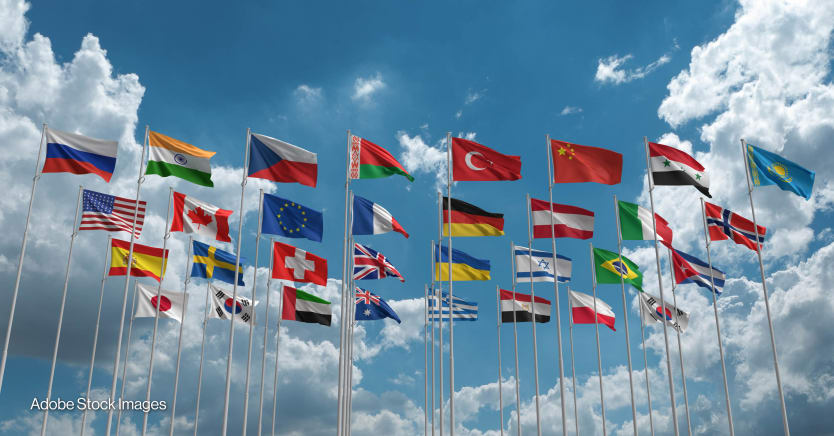
As the United Nations celebrates its 80th anniversary, the international system stands at a historic inflection point — confronting a confluence of crises including the withdrawal of foreign aid assistance, geopolitical fragmentation, intensifying climate emergencies, humanitarian breakdowns, and the accelerating pace of technological disruption.
These overlapping challenges expose the limits of legacy institutions and their siloed responses, destabilizing the foundations of global cooperation. The familiar architecture of multilateralism designed in the aftermath of World War II is increasingly misaligned with the complexity, scale, and urgency of today’s world.
Yet, within this disruption lies a generational opportunity: a chance to reimagine a new kind of multilateralism that’s faster, more inclusive, and more impactful. One that shifts from defensive adaptation to proactive transformation. One that rebuilds global cooperation as a networked, technology-empowered ecosystem capable of mobilizing players at every level.
To seize this opportunity, we see five operational paths forward — practical building blocks for a multilateral system designed to meet the demands of a polycrisis era.
1. Future-proofing institutional operating models
Multilateral institutions must evolve beyond rigid, siloed bureaucracies. Many U.N. agencies and international organizations still operate in fragmented ways, driven by a race for relevance and survival instincts rather than long-term, systemic innovation. What’s needed now is a shift to adaptive, mission-driven operating models that align focus and capabilities across the entire ecosystem.
This transformation starts with breaking down silos and fostering cross-agency collaboration, whether through shared innovation platforms, common procurement services, or interoperable data systems. These new structures should be built on principles of subsidiarity, accountability, and transparency, supporting multilateral players to deliver results more quickly, more efficiently, and with greater strategic coherence.
Agile multilateralism also demands a mindset shift, from managing mandates to solving problems. That means organizing around real-world outcomes rather than institutional boundaries and using flexible coalitions to address interconnected challenges such as climate resilience, health security, and migration.
2. Embedding technology and private sector at the core of innovation
Technology is not just a tool for modernization; it has become a strategic supporter of transformation. Emerging technologies such as artificial intelligence and blockchain can radically improve the effectiveness, transparency, and agility of global cooperation. AI, for instance, can improve real-time decision-making, automate burdensome reporting processes, and strengthen early warning systems. Blockchain can build trust through traceable funding flows and tamper-proof delivery mechanisms.
To unlock this potential, multilateral systems must move beyond using the private sector as a donor or vendor and instead treat the private sector as a co-designer of solutions, helping shape strategy, delivery models, and innovation pathways. With many technology firms and multinationals commanding resources and capabilities that rival nation-states, they must become integral to multilateral efforts — not in competition, but in collaboration.
To do this responsibly, governance frameworks must evolve to manage risks and uphold public values. This includes clear standards for data use, safeguards against bias, strong regulation, and accountability mechanisms to ensure technology serves people, not the other way around.
3. The power of networked multilateralism through cities and civil society
With 7 out of 10 people predicted to live in cities by 2050, urban centers are emerging as both frontline responders and innovation hubs. Cities are not just implementing global agendas; they are shaping them, from climate action to social inclusion.
Meanwhile, civil society organizations, grassroots movements, and community networks are building resilience and catalyzing change where formal systems fall short. These groups must no longer be seen as peripheral. They are essential nodes in a networked multilateralism that is grounded in local realities and capable of achieving global scale.
Empowering these networks requires investment in decentralized governance models, local capacity, and cross-border learning. It also calls for inclusive platforms that help collaboration between cities, regions, and non-state players to unlock the full potential of polycentric governance and channel local and global funding flows to address a pre-identified set of common priorities.
4. Building common ground in a multipolar world
In today’s rapidly shifting geopolitical landscape, trust in institutions is declining amid rising polarization, misinformation, and fragmented narratives. Legitimacy cannot be taken for granted; it must be earned through moral leadership, inclusive engagement, and transparent communication.
Tomorrow’s multilateral leaders must be equipped to act decisively, think systemically, and collaborate across differences. This means investing in the next generation of leadership — embracing diversity and promoting cross-sector experiences, but also building capacity not just for policy, but for empathy. This also requires stronger attention to narrative-shaping using 21st-century toolboxes, building coalitions through soft power, and practicing clear, value-based communication to combat disinformation and foster collective action. In a world of real-time news cycles and contested facts, the ability to communicate purpose, progress, and principles has become a core capability of effective multilateralism.
5. Revamping sustainable financing to mobilize capital at scale
Climate resilience, pandemic preparedness, food security, digital inclusion — these are global objectives that require coordinated, long-term investment. Traditional development finance, however, is increasingly insufficient. Mobilizing the trillions required to deliver on global goals means unlocking new, sustainable financing models that leverage both public and private capital.
Innovative instruments such as blended finance, guarantees, and outcome-based contracts can help de-risk investments and align financial flows with development impact. Development banks and multilateral institutions must continue to play a catalytic role — creating investment-ready pipelines, strengthening policy environments, and enabling strategic partnerships that crowd in private capital.
At the same time, new digital platforms and knowledge-sharing mechanisms can improve transparency, match capital with demand in real time, and foster alignment around measurable outcomes.
A moment for collective reimagining
Multilateralism has always evolved to unite willing players and changemakers against humanity’s greatest challenges. The transformation required today is not just about efficiency; it is about survival, solidarity, and shared purpose. The crises we face are transnational by nature and systemic in effect. No institution, no government, and no sector can face them alone.
This is the time to move beyond incremental reform and embrace bold redesign. To rewire multilateralism as a distributed, networked, and mission-oriented system capable of delivering at the speed and scale the world now demands.
This 80th year of U.N. history marks a turning point to break old rules, forge unprecedented partnerships, and redefine the limits of what multilateral action can deliver.
EY's International Development Hub is a team of Geneva-based professionals advising U.N. agencies and international organizations on strategy and transformation, such as designing future-proof operating models, securing sustainable funding, optimizing back-end operations, and leveraging new technologies to improve adaptability. Backed by EY’s global network of 400,000 professionals across the globe, the hub is committed to helping build a more resilient and sustainable future with confidence.
The views reflected in this article are those of the author and do not necessarily reflect the views of the global EY organization or its member firms.










